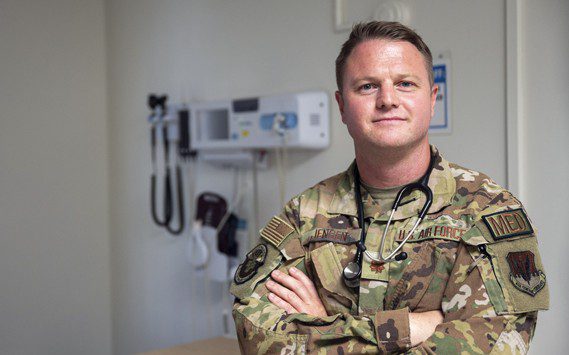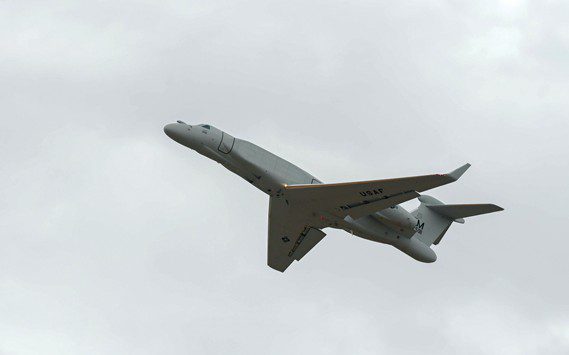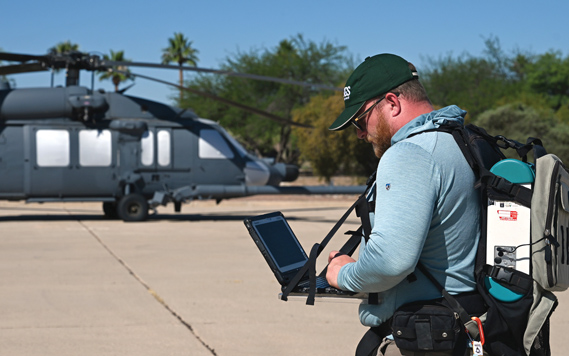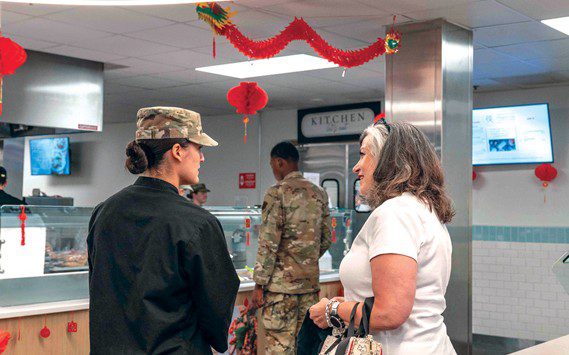Editor’s note: This article was first published March 31, 2010.
SNOWMASS VILLAGE, Colo. — In the blink of an eye your life can change forever.
That’s exactly what happened to Sean Halsted when he fell 40 feet to the ground while fast roping from a helicopter during a training mission at Hurlburt Field, Florida. He went from an active-duty combat controller to a U.S. Paralympian in the 2010 Vancouver Games.
“I don’t remember what happened,” Halstead said, a former combat controller stationed at then McChord Air Force Base, Washington. “I just know one minute I was reaching for the rope and the next I was on the ground with my back hurting and the guys are telling me to lay still. We had some (pararescuemen) there too, and they were telling me to lay still and wiggle my toes. It was just a simple training, and I fell off the rope.”
As a result of the accident, Halsted incurred a first lumbar vertebrae burst fracture that damaged his spinal cord.
“That left me a pretty low (paralysis),” he said. “As a paraplegic, that’s pretty good because there’s a lot of guys who have a (paralysis) in the (thoracic vertebrae) level and they have a lot less function than I do.”
Halsted’s outlook about his prognosis of his injury wasn’t always so positive.
“When I got hurt it felt like, life was over. Good thing there’s the Internet; good thing there’s DVD players,” Halsted said. “I’ll just be sitting in my room passing the time and looking on the Internet. I found out that’s not the case. Life goes on. Life is still there.”
The Department of Veterans Affairs staff helped Halsted see he had access to programs to help him get back to living life.
“The VA is a great insurance company,” he said. “We’ve got one of the best programs that help you out with anything that you’ve got. It’s workman’s (compensation) basically. I’ve met a bunch of guys who’s workman’s (compensation) gave up on them a long time ago and they had to turn to the VA because they didn’t know what was available to them. I was just lucky I had the right people in the right places that said no, you’re good to go, you’ve got these support systems. It’s there, don’t worry about. If things happen it’s there. There are people to look after you.”
The Washington State University graduate said his physical training as a combat controller also helped him on his road to recovery.
(As a combat controller) you have these expectations,” Halsted said. “You can’t accept sitting in your room. It took me a while to get through that because I was stuck in my room. I couldn’t do the level of stuff I used to do. The training really did help me because my expectations were a lot higher.”
Upon the urging of his physical therapist and the staff at Veterans Affairs, Halsted discovered a program that met his high physical expectations — the National Disabled Veterans Winter Sports Clinic.
“I started at winter sports clinic in 2001,” he said. “It took three years to get here because I thought, ‘Why would anyone want to put themselves through that kind of gut check; to come up to the mountains and wheel around in the snow?’ I thought, ‘What’s the point?’ Then I came and I was like, ‘Wow, I was such an idiot!”
Once Halsted started attending the NDVWSC, he realized he had a passion for adaptive Nordic skiing versus the adaptive Alpine skiing he was doing before.
“I went with cross country skiing because I like that endorphin rush and it’s fun being out in the woods and it’s fun being on the slopes,” he said. “I was an Alpine skier before. Racing Alpine just isn’t my thing. I just wasn’t getting that exertion that I used to get. For me it was just a natural fit to come to Nordic skiing. It just fit everything I wanted.”
The training at the winter sports clinic helped Halsted go on to compete at the next level.
“It was essential basically because it exposed me to what was possible,” he said. “Without that exposure, I don’t know that I would’ve tried. I think it would’ve taken me a lot more to get out and start doing stuff. I would’ve just stuck with wheelchair basketball and I wouldn’t have been happy. It was because they exposed me to these sports that it was like ‘Oh wow, there’s more out there.’”
In the 2010 Vancouver Paralympic Games, Halsted finished in the top 10 in all three of the events he participated in, and he’s not planning on slowing down anytime soon.
“I’m definitely going to keep trying to go with the Nordic adaptive ski team,” he said. “Hopefully it’ll mean (Sochi Russia 2014 Winter Games) in the next four years and definitely it’ll mean World Cups in Europe and where ever they are in the next fours years. I want to push it as far as I can but I also want to open up the sport. I don’t want someone to be like, ‘I wish I had known about that.’ I can’t let that be an excuse. The worst excuse I can hear is I wish I had known about that. I want to be part of the solution and make sure more people know and more people get involved.”












